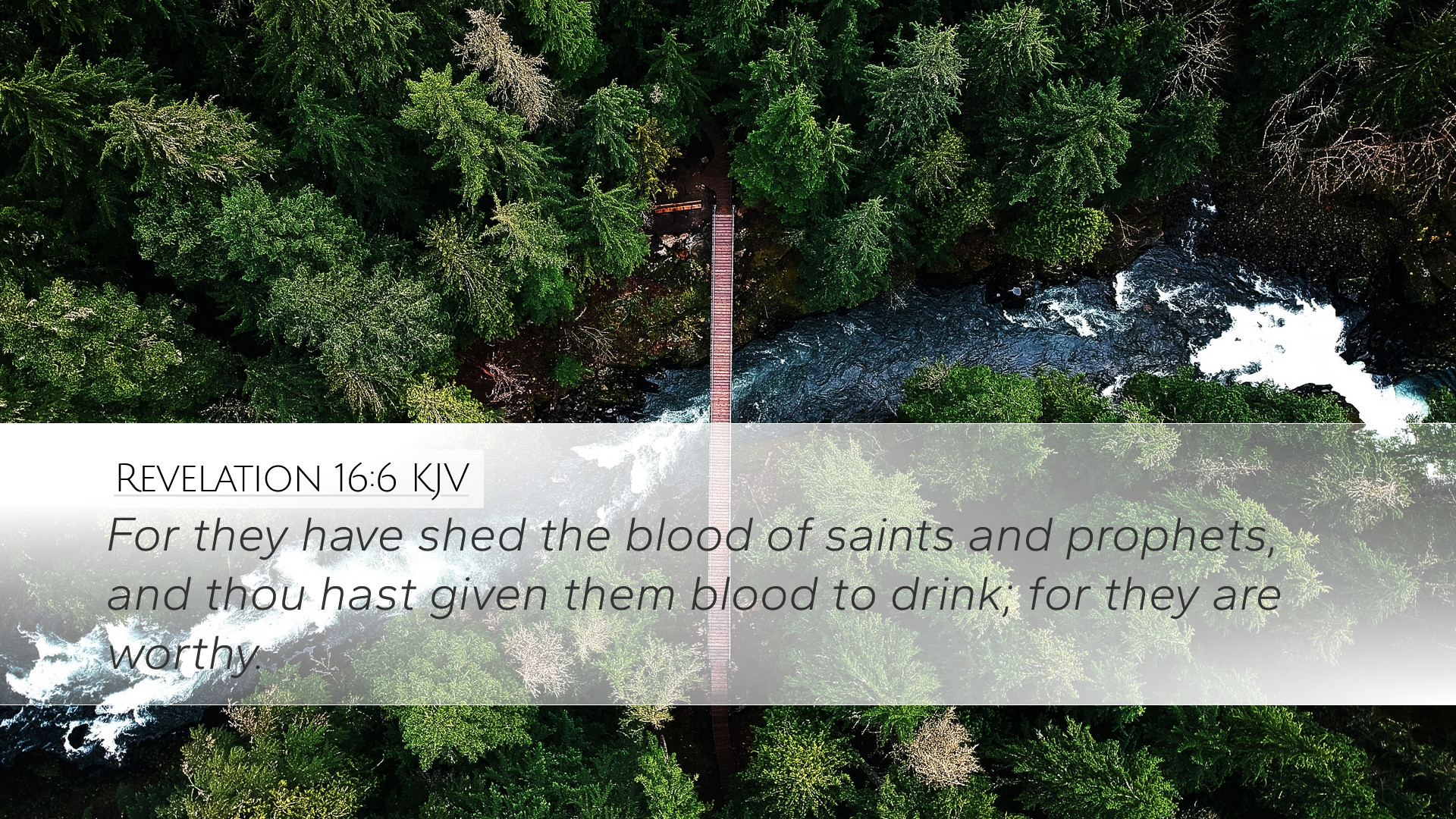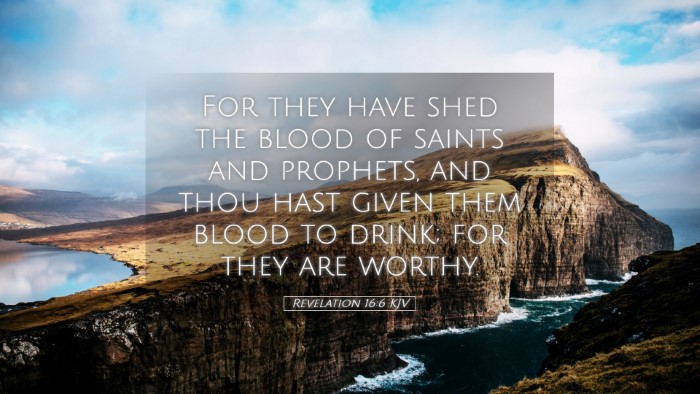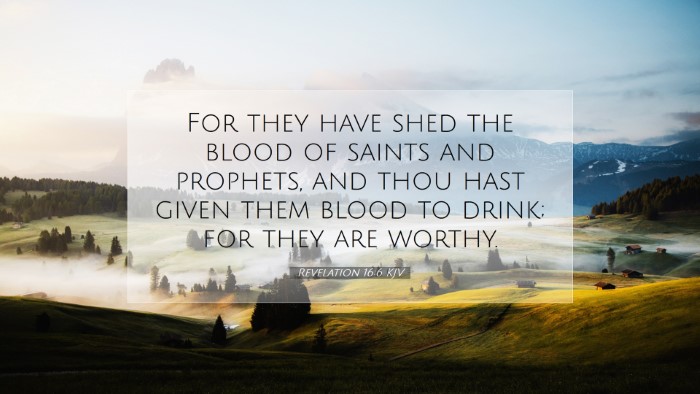Commentary on Revelation 16:6
Verse Context and Overview
Revelation 16:6 states: "For they have shed the blood of saints and prophets, and thou hast given them blood to drink; for they are worthy." This verse is part of the prophetic visions presented by John regarding the bold judgments of God during the end times. The imagery of blood serves as a significant theme and emphasizes divine justice.
Historical and Theological Insights
Public domain commentaries provide a wealth of insights into the implications and interpretations of this passage. Matthew Henry, Albert Barnes, and Adam Clarke offer varied perspectives that highlight the gravity of the message contained within this verse.
Matthew Henry's Commentary
Henry notes the severe judgment that is to befall those who have persecuted the faithful. The phrase "thou hast given them blood to drink" indicates that the retribution being poured out upon the wicked is a fitting consequence for their sins. Henry elaborates on the notion of divine justice, portraying God not only as a loving deity but also as a righteous judge who cannot overlook wickedness.
Key Observations from Matthew Henry:
- The justice of God: The punishment inflicted upon the wicked is proportional to their sins; having shed innocent blood, they are now forced to drink blood, symbolizing the severity of their retribution.
- Reflection on martyrdom: Henry emphasizes the suffering of saints and prophets, reminding readers of the perpetual struggle between good and evil throughout history.
- Encouragement for believers: This verse serves as a source of encouragement for the faithful, assuring them that God will ultimately vindicate their suffering at the hands of the unjust.
Albert Barnes' Commentary
Barnes approaches this verse by highlighting the symbolic nature of "blood" within biblical texts. He explains that blood often signifies life and death, and in this context, it illustrates the life taken by the persecutors of believers. Barnes discusses the implications of divine vengeance, illustrating that the judgments of God are not arbitrary but instead carefully measured according to the deeds of humanity.
Key Observations from Albert Barnes:
- The symbolism of blood: Blood represents both guilt and punishment; the drinking of blood serves as a metaphor for the full realization of their evil deeds.
- God's sovereignty: Barnes rightly emphasizes that God’s sovereignty ensures that no act of injustice goes unrecognized or unpunished.
- Ethical implications: The commentary stresses the importance of ethical living and warns against the consequences of bloodshed, urging believers to remember the cost of fidelity to God.
Adam Clarke's Commentary
In Clarke’s analysis, he interprets the verse as a profound indictment against those who dishonor God through their actions. He articulates that the phrase "for they are worthy" can be understood as an acknowledgment that the fate they receive is merely what they deserve based on their wickedness. Clarke’s insight into the moral framework of retribution is particularly striking, as he emphasizes the requirement for justice in a moral universe.
Key Observations from Adam Clarke:
- Retributive justice: Clarke’s interpretation reinforces the concept of retributive justice, suggesting that divine laws demand recompense for evil deeds as a reflection of God's moral order.
- Warning against complacency: Clarke issues a cautionary note for both individuals and societies to remain vigilant against the corrupting influence of sin, lest they succumb to similar fates.
- Encouragement of righteous living: Like Henry, Clarke observes that this verse serves as an encouragement to observe righteous living, trusting that God will right wrongs in His perfect timing.
Reflective Applications for Pastors and Theologians
This profound verse urges pastors, theologians, and believers alike to contemplate the weight of divine judgment and the precious nature of martyrdom. The lessons drawn from Revelation 16:6 emphasize the seriousness of faithfulness in a world often hostile to the Gospel. As reverberations of this judgment unfold, they find numerous applications:
- The Cost of Discipleship: This verse prompts a discourse on the cost of discipleship, encouraging believers to recognize the potential sufferings that accompany a faithful life.
- Vindication of Suffering Servants: Many find solace in the promise that God will vindicate the suffering they face for the sake of righteousness.
- Call to Advocacy: The passage serves as a call to advocate for those who are marginalized and oppressed in society, reminding leaders to defend those who cannot defend themselves.
Conclusion
The exploration of Revelation 16:6 through the lens of these notable commentaries provides a deep understanding of God's justice and the severe implications of rebellion against Him. This verse not only reflects the nature of divine retribution but also serves as a reminder to remain steadfast amid persecution, upholding faith in the righteousness of God's character. Ultimately, this passage calls the faithful to live with an awareness of their actions and the inevitable consequences before a holy God, navigating a world that frequently challenges their convictions.


